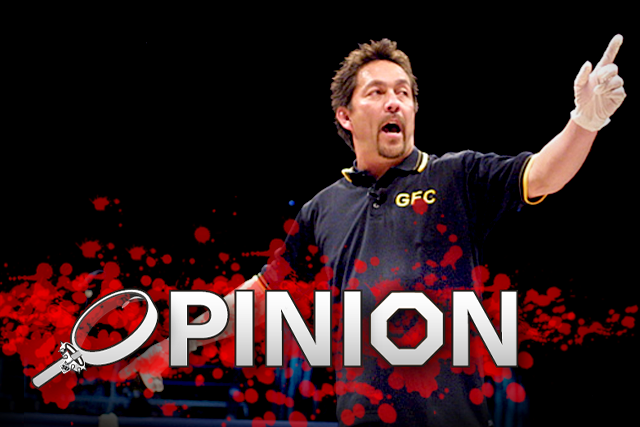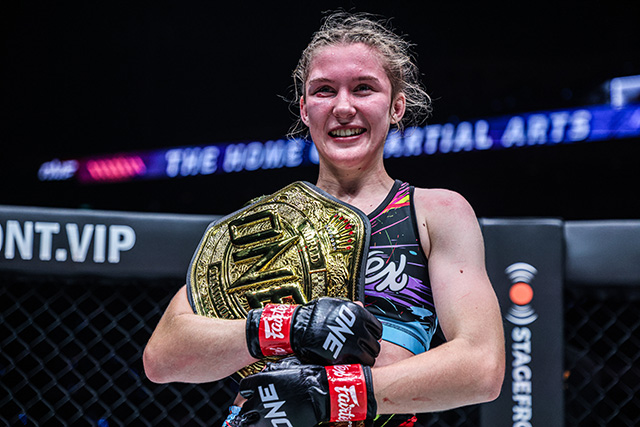Opinion: The Unfairly Maligned Mario Yamasaki

Editor’s note: The views and opinions expressed below are those of the author and do not necessarily reflect the views of Sherdog.com, its affiliates and sponsors or its parent company, Evolve Media.
Advertisement
Nowadays, the name “Mario Yamasaki” is used as a joke. Countless comments on YouTube videos, MMA message boards and across social media invoke him as a bloodthirsty referee who will let fighters be dismembered or die before stopping a match, a man who took the “just bleed” mindset to absurdity with his late stoppages. Everyone is in agreement here, and even casual fans have heard of this allegedly dangerous lunatic. Indeed, Yamasaki has not worked in the Ultimate Fighting Championship since February of 2018, when he got the assignment for soon-to-be flyweight champ Valentina Shevchenko’s fight with Priscila Cachoeira, in which the badly overmatched Cachoeira took a brutal amount of damage.
However, is Yamasaki's reputation deserved? No. Moreover, I don't think his performance in the Shevchenko-Cachoeira fight was necessarily wrong. Rather, I think UFC President Dana White used Yamasaki as a convenient scapegoat for the promotion’s own matchmaking incompetence, a subject I've written about before, and the resulting blowback from the result of that contest.
Let's begin by closely examining the fight itself. I came to it
with a different perspective than most, having watched it a few
weeks after it occurred, after the fallout over the stoppage. Thus,
I spent the entire duration of the battle keenly watching for a
clear moment that Yamasaki should have halted the action.
And here's the problem: It doesn't exist.
The fight begins, and not 25 seconds later, Shevchenko lands a flush left cross to the chin that hurts “Zombie Girl,” causing her to wobble backwards. Shevchenko lands a few follow-up blows, but Cachoeira largely recovers and starts firing back strikes of her own, right until Shevchenko takes her down with an inside trip 40 seconds into the bout. It's interesting to note that while Shevchenko might have finished her opponent in under two minutes standing up, it simply wouldn't be her style. Shevchenko takes whatever opportunities the opponent gives her, and always seeks to be as ruthlessly efficient as possible, reducing risk whenever she can. She will choose a dominant victory taking an opponent down and pounding her out over 15 minutes that is 100% guaranteed over a knockout in the stand-up in under a minute that is only 95% likely.
And indeed, the future legend and champion goes to work hammering away with punches to Cachoeira's body and head at a steady pace inside the guard, and then adding some brutal elbows to the head for good measure. As Paul Felder, color commentator for the fight rightly noted, the Brazilian did a poor job defending, not correctly controlling Shevchenko’s biceps. At the same time, there is never a moment for the referee to jump in and stop the fight. Shevchenko’s offense is rhythmic, not continuous; she will throw several powerful strikes, stop for a while, rinse and repeat. And showcasing the tremendous toughness and heart that will come up in her later fights, Cachoeira refuses to give up, continuing to intelligently defend herself at all times.
Shevchenko lands a brutal series of elbows and punches to the head of Cachoeira, which is trapped against the fence, only two minutes into the contest, with Yamasaki taking a very close look. However, Cachoeira is able to tie her up and stop the damage for long enough to let the match continue.
Shevchenko continues punishing her with the occasional hard elbow and punch, but the pace abates in the second half of the round, with Cachoeira receiving damage in her guard at a slower rate. Indeed, with the Brazilian trying to protect her head, Shevchenko targets her body with a series of rapid-fire punches beginning with about 90 seconds left in the round. While they clearly hurt, since when was a fight stopped because of punches to the body of a grounded opponent? The round ends, and interestingly, Shevchenko didn't land a single significant strike during the last 25 seconds.
Round 2 starts, and after some early striking success on the feet, Shevchenko takes the path of least resistance with another easy inside trip takedown. She quickly passes to side control, and a minute into the stanza, obtains her beloved crucifix position, with which she would later stop Katlyn Chookagian and Jessica Andrade. She lands a series of short punches to the head, but none are especially hard, and Cachoeira, to her credit, is trying like crazy to find a hip and get out. 90 seconds in, Shevchenko transitions to an old-school keylock, but Cachoeira, ever tough, refuses to tap. Shevchenko then works to re-establish the crucifix position, and two minutes into the round, succeeds. Interestingly, Cachoeira has received relatively little damage so far this round. At this point, Shevchenko starts landing more short punches. While some referees would have stopped it here, many, not just Yamasaki, wouldn't. It's definitely a judgment call; none of the individual punches are especially hard, and they're not even a continuous stream of blows, as Shevchenko temporarily stops to cut off Cachoeira's escape attempts and maintain position. And lest one think this is hypothetical, Zombie Girl does manage to escape, getting back to side control halfway through Round 2. As with the first round, the pace now slows for the next minute. Interestingly, while the commentators have noted how dominant Shevchenko's performance is, none have suggested that the fight should have been stopped less than a minute before Yamasaki actually steps in. With 85 seconds left in the round, Shevchenko passes to mount. Ten seconds later, she starts opening up with a brutal series of punches as Felder notes the fight “may be stopped.” Yamasaki agrees, as he is getting very close to the combatants. However, right as he does so, Cachoeira turns her back and the punishment momentarily halts, though not for long, as Shevchenko flattens her out and starts landing another hard series of shots with a minute left. While most referees would indeed have stopped it here, I can't fault Yamasaki for giving her an extra second or two. And during those extra moments, Cachoeira actually manages to partially sit up and almost escape! Of course, Valentina is too good and muscles her back to the canvas. Valentina continues her assault, but with 45 seconds left in the round, transitions to a rear-naked choke. Cachoeira taps out soon after. Yes, Yamasaki missed the initial tap, but he catches the second one a second or two later, which I don't consider a big deal.
Was there a clear, obvious moment that Yamasaki should have stopped it? I don't think so. At most, he might have stepped in four minutes into Round 2 as opposed to the actual stoppage, which occurred at 4:25. Cachoeira didn't receive much extra damage in those 25 seconds, either. Interestingly, in a subsequent interview Yamasaki noted the same thing I did: “In the second round, I signaled to ‘Pedrita’ that if she didn’t move I’d stop the bout. Every time I went to stop it, I signaled it to her, and she moved in an attempt to escape the blows.”
What were the reasons for the outrage here? There are two. Firstly, there is a disparity in how damage is perceived in male versus female MMA, and even how referees work such bouts. Women’s fights are stopped when an equivalent amount of damage in a male fight wouldn't necessarily cause a referee to step in. Consider the hellacious damage that Anthony Smith received in his loss to Glover Teixeira, including losing multiple teeth. As with Cachoeira, the majority of the damage came from the opponent's devastating ground-and-pound. I believe Smith suffered far more damage, and it objectively extended over far more time, with his fight lasting 21 minutes, 4 seconds, more than twice the duration of Shevchenko-Cachoeira. Yet I don't recall a barrage of criticism towards Jason Herzog, the referee for that fight, or calls for him to be fired, as occurred with Yamasaki. (For the record, I think Herzog is an excellent referee, one of the best working today. This is simply meant to highlight the difference in reaction to two similar cases.)
Nor am I the first person to realize this. Recall that Aspen Ladd appealed Herb Dean's stoppage in her knockout loss to Germaine de Randamie, claiming there was a double standard and Dean would have given a male fighter an opportunity to recover he didn't grant her. Whether one agrees with Ladd's particular appeal or not, it's noteworthy that it was rejected by the slimmest of margins by the California State Athletic Commission, three votes to two.
Yamasaki, by contrast, refereed a women's match exactly the way he would a men’s match. This is even reflected by his own comments, stating that he “allowed ‘Pedrita’ to be a warrior and keep fighting.” Should he be punished for such fair-mindedness, simply because it's atypical among referees today?
The second reason is to distract from the UFC's own pathetic failure in booking this match-up to begin with. It was the equivalent of pitting Kamaru Usman versus Cole Williams, or Francis Ngannou against Roque Martinez. Priscila Cachoeira has a very inspiring story, with her mother helping save her from crack addiction and sex abuse on the streets. Once she got clean, she was weak and scrawny, with no background in fighting, yet she had an insane, delusional dream: She was going to fight in the UFC. As her own brother, an MMA fan, noted “You're crazy, you don’t even know how to punch.” Yet that's exactly what the Brazilian achieved.
However, let's not be under any illusions. Cachoeira's pre-UFC fights demonstrate a very limited, beginning fighter, one that came forward with reckless abandon, throwing a bunch of wide, sloppy, slow hooks that left her chin completely exposed, and who badly lacked grappling. (For the record, Cachoeira has improved considerably during her time in the UFC.) And whom did they match her against? Someone who was already one of the greatest female fighters ever, a superlative striker and grappler who had already dominated Holly Holm, and who in her last fight had co-headlined UFC 215, losing a split decision to Amanda Nunes that many, myself included, believe she deserved to win.
It was a match that should never, ever have been made, and was always going to result in a lopsided beating. If anyone should be criticized and lose their jobs, it's the matchmaking team of Sean Shelby and Mick Maynard. However, White likes the two and they hold important positions within the UFC. It was much easier and more expedient to blame it on the referee, whom he blasted in interviews. Thus, Yamasaki became the scapegoat for the UFC's own failures, and unfortunately, the majority of fans went along with this easy narrative. Thus, Yamasaki lost his job, and in my view, the UFC lost a decent ref.
« Previous Kennedy Nzechukwu on Comeback Victory: ‘I Just Had to Suffer and Push, Push, Push’
Next Conor McGregor to Sponsor Irish Team at 2021 IMMAF Youth MMA Championships »
More




 UFC News & Features
UFC News & Features


